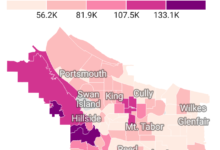
Amid the complex challenges of the ongoing housing crisis, the investor-driven real estate market has taken center stage. A new report from Redfin, released last week, reveals an interesting trend: Over the past year, private investors—defined by Redfin as any institution or business—have purchased $43 billion worth of homes in 39 metropolitan areas, marking an increase of nearly 14 percent since 2023. While townhouses and multifamily units represent a small fraction of these purchases, investors show a strong preference for single-family homes and condos, which account for about 69 percent and 19 percent of the transactions, respectively.
The issue is not new: Redfin has been monitoring corporate home purchases since 2000, with fluctuations in investor activity often linked to major events like economic downturns and the pandemic. The most recent surge is the largest since 2022 when high interest rates and elevated home prices slowed individual home purchases, increasing rental demand, according to the study. In the second quarter of 2024, investors purchased one in six of all homes sold, marking an increase of over three percent despite a prior decline in individual home sales this year. However, whether this upward trend in corporate home buying calls for intervention remains debatable.
Bloomberg distinguishes between large corporate landlords on Wall Street who purchase single-family homes and smaller, local landlords, often referred to as mom-and-pop owners. According to Bloomberg, “the number of homes owned by Wall Street is exceedingly small in most U.S. cities.” Citing a report from the Urban Institute titled “Place the Blame Where It Belongs,” Bloomberg adds that investor interest is more of a symptom than a cause of the housing shortage. Corporate investors do not create new demand or remove homes from the local market unless there are other underlying issues. Instead, they often buy properties that need upgrades, thereby improving the overall housing supply. Moreover, first-time homebuyers generally lack the capital necessary to handle substantial upfront costs, which makes competing with these investors challenging.
Despite ongoing research, there is still a strong push to end the practice of large-scale homeownership by investment firms. The proposed End Hedge Fund Control of American Homes Act, currently before Congress, aims to tax hedge funds that own significant numbers of single-family homes, encouraging them to return some of these properties to the market. Vice President and presidential candidate Kamala Harris recently outlined her housing policy at a campaign event in North Carolina on August 16. Among other measures to reduce the cost of essentials like food and groceries, her plan includes eliminating tax incentives for companies that purchase large numbers of single-family homes.
Even when corporations own just a small portion of the housing market, they can exert significant influence. A 2022 investigation by ProPublica found instances where corporate landlords increased rents by as much as 33 percent. Even a smaller rise—like five percent—could result in thousands more people becoming homeless in a city like New York, according to the report. Additionally, questionable fees and other financial pressures can further strain tenants, even as some large landlords benefit from loan assistance provided by Freddie Mac.






